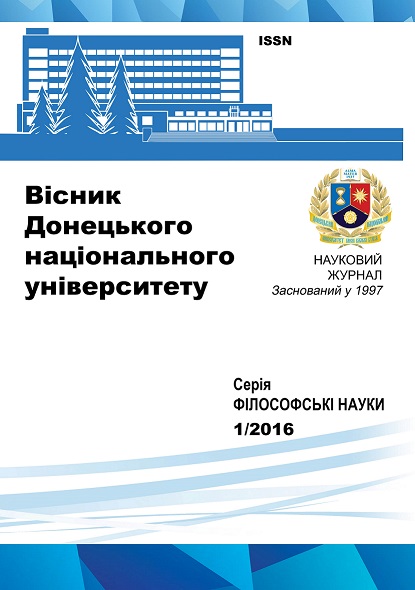«Mirovozzrenie» or «Mirosozercanie»: the Historical Metamorphosis.
Keywords:
mirosozercanie, mirovozzrenie, miroponimanie, worldview, Weltanschauung, the substance of the people, radicalism, literary criticism, ideology, neo-Kantianism, scientismAbstract
The turn of Russian public consciousness and official ideology in the direction of militant conservatism is the reason for writing this. The emergence of the terms «mirosozercanie» and «mirovozzrenie» in public-political discourse is a symptom of a return to old Soviet-Orthodox rhetoric. Analysis of the process of the emergence and historical metamorphosis of the words «mirovozzrenie» and «mirosozercanie» are the target of the article. The words «mirosozercanie» and «mirovozzrenie» are translations-calques German word «Weltanschauung», which appeared in the philosophy of Kant and the romantics. First, the word «mirosozercanie» Belinsky uses in the article «Russian literature in the 1840s» (1841). The meaning of this term is closest to the modern concept of «mentality»; it meant «collective unconscious» of a people, which is reflected in the best examples of literary creativity of his genius. N.A. Dobrolyubov offers a different interpretation of the concept of «mirosozercanie». It means is alive, intuitive, holistic awareness of Reality, which inspires the writer to be creative. N.G. Chernyshevsky gives the notion of «mirosozercanie» a somewhat different meaning than its predecessors Belinsky and N.A. Dobrolyubov. He understands this word as a rationalistic system of views and beliefs that are influenced by the social environment, education and self-education. The word «mirosozercanie» the favorite word of all «front line» of the Russian literary journalism of the second half of the nineteenth century stated in this article. This word is used N.K. Mikhailovsky, G.V. Plekhanov, A.V. Lunacharsky, V.I. Lenin. The word «mirovozzrenie» is the German word «Weltanschauung» as well. It appears later in the Russian language and has a different meaning. K.D. Kavelin first uses it in the article «Our mental system» (1875). «Mirovozzrenie» meant a scientific philosophic rational awareness of reality. V.I. Vernadsky, F.A. Stepun, B.V. Yakovenko, S.L. Frank, N.O. Lossky used the term widely. Consistency of terminology in Soviet ideology and philosophy was absent initially. Trotsky proposed to remove the words «mirosozercanie», replace them with «miroponimanie». Gorky discerned the meaning of «mirosozercanie», «mirovozzrenie» and «miroponimanie». Only the last word he thought appropriate to the new man in Soviet society. However, in the Soviet philosophy was utvidelse new «standard» – mirovozzrenie. Stalin adopted it in his essay «O dialekticheskom i istoricheskom materializme» (1938). This «standard» will be the basis of the Soviet Marxist-Leninist philosophy.References
Владимир Путин поговорил об истории с учеными // Российская газета. – № 6994 – 22.06.2016. – С. 1.
Иларион (Алфеев), архиепископ Волоколамский. Патриарх Кирилл. Жизнь и миросозерцание / Иларион (Алфеев) – М.: ЭКСМО-ПРЕСС, 2009. – 580 с.
Шестов Л. Вячеслав Великолепный. К характеристике русского упадочничества // Л. Шестов. Сочинения в 2-х томах. – Том 1. – М.: Наука, 1993. – С. 243–277.
Тимур. Бог, Путин, люди. / Тимур. – (б.м.), 2015. – 286 с.
Белинский В. Г. Русская литература в 1840 году // В. Г. Белинский. Собрание сочинений в трех томах. – Т. I. Статьи и рецензии. 1841–1845. – М., ОГИЗ, ГИХЛ, 1948. – С.697–736.
Белинский В. Г. Статья ІІ // В. Г. Белинский. Собрание сочинений в 9 т. – Т.4.: Статьи, рецензии и заметки. Март 1841 - март 1842. – М., «Художественная литература», 1979. – С.91–152.
Добролюбов H. A. Темное царство // Н. А. Добролюбов. Собрание сочинений в 9 т. – Т. 5. – М., 1962. – С. 7–139.
Чернышевский Н. Г. Эстетические отношения искусства к действительности (Диссертация) // Н. Г. Чернышевский. Сочинения: в 2 т. – Т. 1. – М.: Мысль, 1986. – С. 71–173.
Кавелин К. Д. Наш умственный строй // К. Д. Кавелин. Наш умственный строй: Статьи по философии русской истории и культуры. – М.: Издательство «Правда», 1989. – С. 307–319.
Франк С. Л. Введение в философию в сжатом изложении / С. Л. Франк. – С-Пб: Абрис-книга, 1993. – 96 с.
Ленин В. И. Детская болезнь «левизны» в коммунизме // В. И. Ленин. Полн. собр. соч. 2-е изд. – Т. 41. – С.4–104.
Ленин В. И. Три источника и три составных части марксизма // В. И. Ленин. Полн. собр. соч. 2-е изд. – Т.23. – С. 43–48.
Троцкий Л. Д. История русской революции: в 2 т. / Л. Д. Троцкий. – Т. 1.: Февральская революция. – М.: Терра, Издательство «Республика», 1997. – 464 с.
Троцкий Л. Д. Внимание к теории. Письмо в редакцию журнала «Под знаменем марксизма» // Л. Д. Троцкий. Проблемы культуры. Культура переходного периода. – М.: Директ-Медиа, 2015. – С.182–186.
Горький М. О пьесах // М. Горький. Собрание сочинений в 30 т. – Т. 26: Статьи, речи, приветствия. 1931–1933. – М.: Государственное издательство художественной литературы, 1953. – С. 409–426.
Сталин И. В. О диалектическом и историческом материализме / И. В. Сталин. – М.: Государственное издательство политической литературы, 1950. – 86 с.

